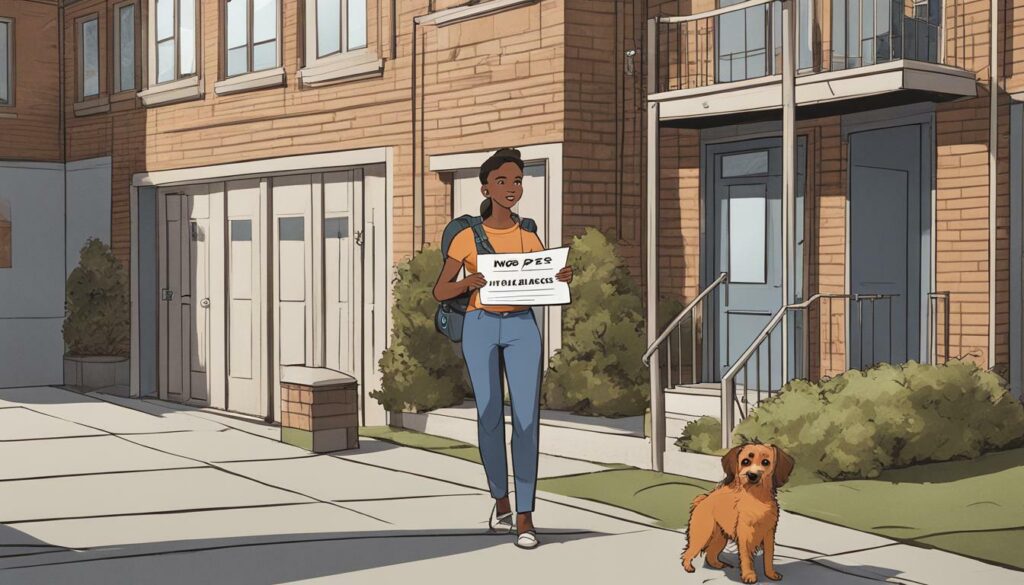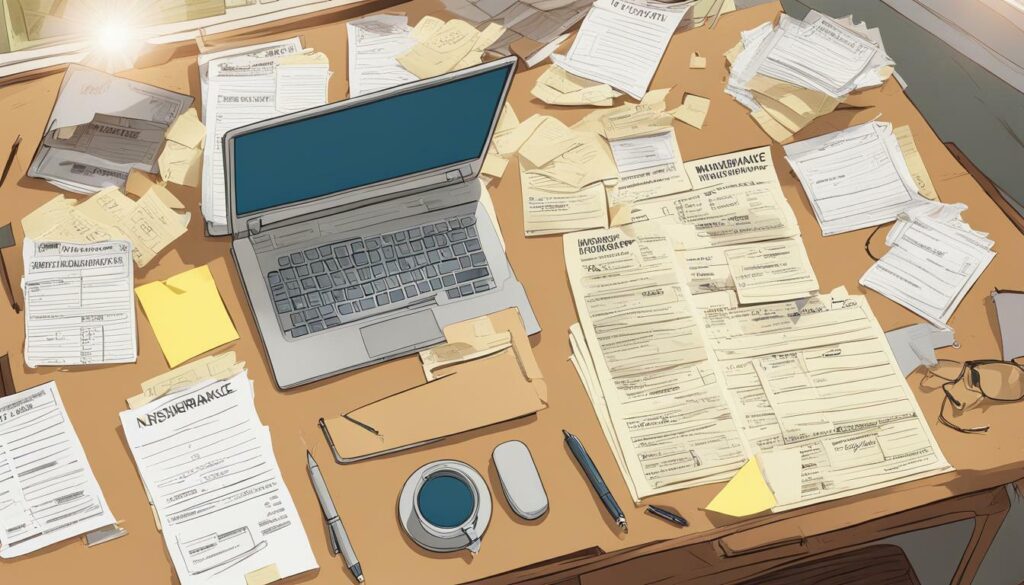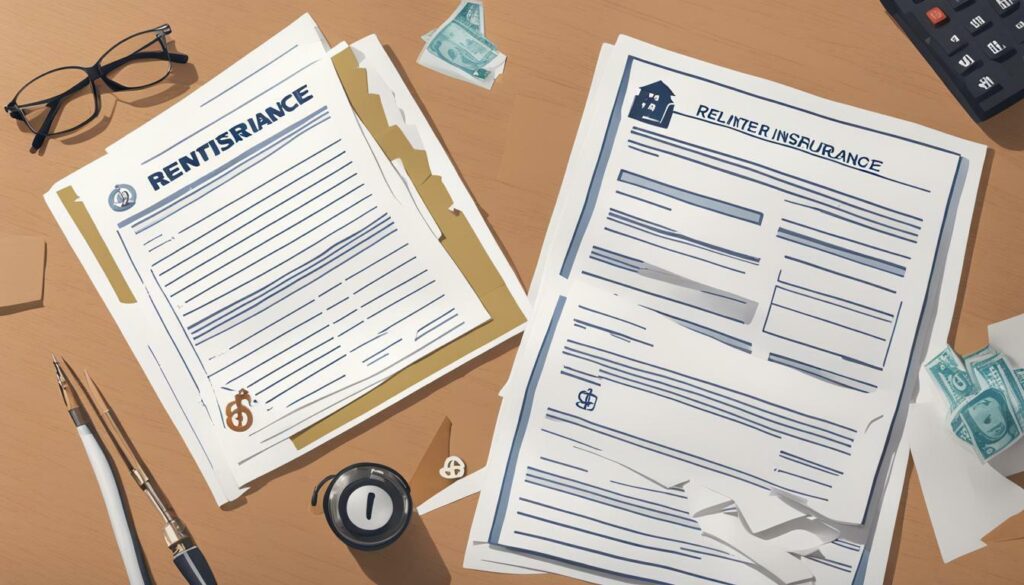If you’re renting a home or apartment, you may already know about renters insurance. But do you know what is covered by your policy? It’s important to understand the three major parts of renters insurance so that you can ensure you have adequate coverage in case of an unexpected event.
Renters insurance policies are designed to protect you and your belongings in case of unexpected events such as theft, fire, or water damage. They generally consist of three major parts: personal property coverage, liability coverage, and additional living expenses coverage. Understanding the details of each of these parts can help give you peace of mind and protect your financial well-being.
Key Takeaways:
- Renters insurance policies consist of three major parts: personal property coverage, liability coverage, and additional living expenses coverage.
- Understanding the details of each part can help protect your financial well-being and give you peace of mind.
Renters Insurance Coverage Overview
As a renter, obtaining renters insurance coverage is a smart decision that can protect you financially in case of unexpected events. Renters insurance coverage is designed to protect your personal property, offer liability coverage, and provide additional living expenses coverage.
Personal property coverage is the first major part of a renters insurance policy, and it covers your personal belongings, such as clothing, furniture, and electronics, in case of damage or loss due to covered events like theft, fire, or natural disasters. Additionally, personal property coverage may include off-premises coverage, which means that your belongings may be covered even if they are not in your rental property.
Liability coverage is the second major part of a renters insurance policy, and it offers protection in case someone is injured on your rental property or if you accidentally damage someone else’s property. Liability coverage may also cover legal fees if you are sued due to covered incidents.
Additional living expenses coverage is the third major part of a renters insurance policy, and it provides financial assistance for temporary living expenses if you are forced to relocate due to a covered event, such as a fire or natural disaster. This coverage may include expenses such as hotel stays, meals, and transportation.
Overall, renters insurance coverage is a valuable investment that can offer peace of mind and financial protection. Next, we’ll dive deeper into the first major part of a renters insurance policy, personal property coverage.


Personal Property Coverage
One of the major parts of a renters insurance policy is personal property coverage. This coverage protects your personal belongings from damage or loss caused by covered perils, such as theft, fire, or water damage.
It is important to accurately value your belongings to ensure you have enough coverage in the event of a loss. Take an inventory of your possessions, and keep receipts, photos, and other documentation to support your claim.
It’s also important to understand what types of items may not be covered under your policy. Some policies may have limits on coverage for high-value items, such as jewelry or art, or may exclude certain types of losses, such as flood damage.
| Covered Perils | Examples |
|---|---|
| Fire or lightning | A fire caused by an electrical malfunction in your apartment building damages your furniture and clothing. |
| Windstorm or hail | A hailstorm damages your laptop and other electronics. |
| Theft or vandalism | Your apartment is burglarized, and your jewelry and other valuable items are stolen. |
| Water damage | A burst pipe in your apartment causes water damage to your furniture and electronics. |


Keep in mind that certain types of losses may require additional coverage, such as earthquakes, floods, or hurricanes. Review your policy carefully and consider adding any additional endorsements or riders that may be necessary to fully protect your belongings.
What Personal Property Coverage Does Not Include
Personal property coverage typically does not include losses caused by certain types of events or situations, such as:
- Earthquakes, floods, or hurricanes, unless you have added additional coverage specifically for these perils
- Normal wear and tear or gradual deterioration of items
- Damage caused by pests, such as rodents or termites
- Intentional damage caused by you or a family member
- Losses caused by war or nuclear events
Understanding what is covered under your personal property coverage is crucial in ensuring you have the protection you need. Be sure to review your policy carefully, and contact your insurance company if you have any questions or concerns.
Liability Coverage
Liability coverage is an important part of your renters insurance policy. It protects you financially if someone is injured on your rental property or if you accidentally damage someone else’s property.
For example, if a visitor slips and falls in your apartment and needs medical attention, your liability coverage can help cover their medical expenses. If your child throws a ball and accidentally breaks a neighbor’s window, your liability coverage can help cover the cost of repairs.
Keep in mind that liability coverage typically has limits, so it’s important to choose a coverage amount that adequately protects your assets and financial well-being. If you have significant assets, you may want to consider purchasing additional liability coverage through an umbrella policy.
It’s also important to note that some policies may exclude certain types of liability claims, such as those related to pets or intentional acts.
Overall, liability coverage is an essential part of your renters insurance policy that can provide peace of mind and protect you financially in unexpected situations.


Additional Living Expenses Coverage
While personal property and liability coverage are the most well-known parts of renters insurance, additional living expenses coverage is just as important. This coverage can provide financial assistance in the event of displacement from your rental property due to damage or destruction caused by a covered peril, such as a fire or hurricane.
When you are forced to move out of your rental due to such an event, your additional living expenses coverage can help pay for necessary costs, such as hotel or rental expenses. The coverage typically also helps pay for expenses like food and transportation that you may not have had to pay for while living in your rental property.
It’s important to note that this coverage is contingent on specific circumstances and may have limits. For example, insurance companies may apply a daily or overall dollar limit to additional living expenses coverage. As such, it’s important to understand the coverage limits, exclusions, and deductibles before purchasing a policy.
A good tip to keep in mind is to keep all of your expenses and receipts related to displacement so you can provide them as proof when filing your renters insurance claim.


Remember, the primary purpose of renters insurance is to protect you from financial loss due to unforeseen events. With the additional living expenses coverage, you can have peace of mind knowing that you will have financial assistance in the event that you are displaced from your rental property due to damage or destruction.
Policy Exclusions
While renters insurance is designed to provide comprehensive coverage for your belongings and liabilities, it’s important to be aware of the policy exclusions. A policy exclusion outlines specific circumstances or types of damage that may not be covered by your renters insurance policy.
Common exclusions include:
- Damage caused by acts of war
- Damage caused by intentional acts, such as vandalism or arson
- Damage caused by natural disasters like earthquakes, floods, and hurricanes (may require separate coverage)
- Damage caused by pests, such as termites or rodents
It’s essential to read and understand the policy exclusions before making any assumptions about your coverage. If you have questions or concerns about your policy, don’t hesitate to reach out to your insurance provider for clarification.
Remember, having renters insurance doesn’t mean you’re invincible. Make sure you take the necessary precautions to protect your belongings and minimize risks in your rented home.


Deductible
When choosing a renters insurance policy, it’s important to understand what a deductible is and how it can affect your coverage. A deductible is the amount of money you agree to pay out of pocket before your insurance coverage kicks in. For example, if you have a $500 deductible and file a claim for $2,000 in damages, you would pay the first $500 and the insurance company would cover the remaining $1,500.
Choosing the right deductible amount can be a balancing act. A higher deductible may result in lower monthly premiums, but it also means you’ll have to pay more out of pocket if you ever need to file a claim. On the other hand, a lower deductible may mean higher monthly premiums, but it can provide greater financial security and peace of mind.
When selecting a deductible, consider your financial situation and what you could comfortably afford to pay out of pocket in the event of a claim. It’s also helpful to weigh the potential benefits and drawbacks of a higher or lower deductible based on your individual needs.


Keep in mind that the amount of your deductible can impact the cost of your renters insurance policy. Typically, the higher the deductible, the lower the monthly premium. However, it’s important to choose a deductible that you can realistically afford to pay if needed.
Filing Renters Insurance Claims
If you experience loss or damage to your personal property, it’s important to file a renters insurance claim as soon as possible. Here are the steps you need to take:
- Report the incident: Contact your insurance company immediately to report the incident and provide details about what happened. The faster you report the incident, the faster the claims process can begin.
- Gather evidence: Collect any documentation or evidence that supports your claim. Take photos of the damage or loss, and make a list of all damaged or lost items. Keep any receipts or appraisals for high-value items.
- File the claim: Fill out the necessary claim forms provided by your insurance company. Be sure to include all of the evidence you have gathered to support your claim.
Once you have filed your claim, your insurance company will likely send an adjuster to assess the damage and determine the amount of the settlement. Keep in mind that the amount you receive will depend on your coverage limits and deductible.
It’s important to be honest and accurate when filing a renters insurance claim. Falsely reporting a claim or exaggerating the damages can result in serious consequences, including the denial of your claim and potentially even legal repercussions.
Remember, renters insurance claims can be stressful, but with the right documentation and evidence, you can make the process go as smoothly as possible.


Tips for Choosing the Right Renters Insurance Policy
Choosing the right renters insurance policy can be overwhelming, but it’s essential to ensure you have adequate coverage. Here are some tips to help you make an informed decision.
Coverage Limits
Consider your personal property’s worth and ensure that the policy’s coverage limit is sufficient to replace it all in case of a disaster. A standard policy covers up to $30,000, but you may need more if you have expensive belongings like jewelry and electronics.
Deductibles
A deductible is the amount you pay out of pocket before your insurance coverage kicks in. A higher deductible will lower your premiums, but you’ll have to pay more in case of a claim. Assess your financial situation and choose a deductible that works for you.
Additional Endorsements
Endorsements are add-ons that provide extra coverage for specific items or events not covered under your standard policy. Examples include earthquake coverage or water damage from backed-up sewers. Consider your location and lifestyle before deciding on any additional endorsements.
Compare Quotes
Get quotes from several insurance companies to compare coverage, limits, and deductibles. Don’t just choose the cheapest option; make sure you’re getting the best value for your money.
Review Policy Annually
Life changes can affect your coverage needs, so review your policy annually. Update your policy if you’ve acquired new possessions, moved to a new rental property, or made any significant life changes.
Remember to read and understand the policy before making any assumptions. By following these tips, you can choose the right renters insurance policy that fits your needs and budget.


Understanding Renters Insurance Rates
When it comes to renters insurance, understanding the rates is crucial to finding the best coverage for your needs. Renters insurance rates are determined based on a variety of factors, including:
- Location: The area you live in can impact your insurance rate, as certain neighborhoods may have higher crime rates or be more prone to natural disasters.
- Coverage: The amount of coverage you select for personal property, liability, and additional living expenses can also impact your rate.
- Deductible: The deductible amount you choose will affect your premium, as a higher deductible typically results in a lower monthly rate.
- Insurance company: Each insurance company has its own pricing model and may offer different rates for similar coverage.
When shopping for renters insurance, it’s important to compare quotes from multiple insurers to ensure you are getting the best rate for your needs. Keep in mind that the cheapest option may not always provide the necessary coverage, so it’s important to evaluate each policy carefully.
Additionally, there are some ways you can lower your renters insurance rate:
- Bundling: Some insurance companies offer discounts for bundling renters insurance with other policies, such as auto insurance.
- Safety features: Installing safety features in your rental, such as smoke detectors or a security system, may qualify you for a discount.
- Higher deductible: As mentioned earlier, a higher deductible can lower your monthly rate.
As with any insurance policy, it’s important to regularly review and update your renters insurance coverage to ensure you have adequate protection. Consider reevaluating your policy annually or whenever significant life changes occur, such as acquiring new possessions or moving to a different rental property.


Reviewing and Updating Your Renters Insurance Policy
It’s important to regularly review and update your renters insurance policy to ensure that it continues to meet your needs. Life changes, such as acquiring new possessions, getting married, or moving to a new rental property can all affect your coverage.
When reviewing your policy, take note of any changes in the value of your personal property. If you’ve acquired expensive electronics, jewelry, or other valuable items, you may need to increase your coverage to ensure you’re adequately protected in the event of a loss.
It’s also important to review your liability coverage limits. If you’ve had a significant change in income or assets, you may want to consider increasing your coverage limits to protect yourself in the event of a liability claim.
If you’ve recently moved to a new rental property, make sure your policy reflects the updated address and any changes in your living situation. You may also want to consider adding additional endorsements, such as flood insurance or earthquake coverage, depending on the location of your new rental property.
Finally, make sure you’re taking advantage of any discounts or savings opportunities that may be available. For example, many insurers offer discounts for bundling renters insurance with other policies or for installing certain safety features in your rental property.


By regularly reviewing and updating your renters insurance policy, you can ensure that you’re adequately protected and that your coverage continues to meet your needs. Don’t hesitate to contact your insurance provider if you have any questions or concerns about your policy.
Conclusion
Congratulations on taking the first step in understanding the importance of renters insurance and its major components. By familiarizing yourself with the three major parts of a renters insurance policy – personal property coverage, liability coverage, and additional living expenses coverage – you are on the path to protecting yourself and your belongings from unforeseen events.
As a renter, it’s crucial to have adequate coverage in case of theft, damage, or accidents on your rental property. Don’t underestimate the value of renters insurance and the peace of mind it can provide.
Remember to regularly review and update your policy as your circumstances change. This includes acquiring new possessions or moving to a different rental property. By doing so, you can ensure you have the right coverage at the right price.
So take the next step and make sure you have the renters insurance policy that’s right for you. Protect your home and your peace of mind today.
FAQ
Q: What are the three major parts of a renters insurance policy?
A: The three major parts of a renters insurance policy are personal property coverage, liability coverage, and additional living expenses coverage.
Q: What does renters insurance cover?
A: Renters insurance typically covers personal belongings, liability for accidents or damage to others’ property, and additional living expenses in case of temporary displacement.
Q: What is personal property coverage?
A: Personal property coverage is the part of renters insurance that protects your belongings in case of theft, fire, or other covered perils. It helps reimburse you for the cost of replacing damaged or stolen items.
Q: What is liability coverage?
A: Liability coverage provides financial protection if you are responsible for causing harm to others or damage to their property. It can help cover legal expenses and the cost of damages awarded in a liability claim.
Q: What is additional living expenses coverage?
A: Additional living expenses coverage helps with the costs of temporary accommodation, meals, and other necessary expenses if you are unable to stay in your rental property due to a covered event, such as a fire or natural disaster.
Q: What are policy exclusions?
A: Policy exclusions are specific circumstances or types of damage that may not be covered by renters insurance. Examples of common exclusions include floods, earthquakes, and intentional acts of damage.
Q: What is a deductible?
A: A deductible is the amount you must pay out of pocket before your renters insurance policy starts covering expenses. Choosing a higher deductible can lower your premium but means you’ll have a higher initial cost in the event of a claim.
Q: How do I file a renters insurance claim?
A: To file a renters insurance claim, contact your insurance provider as soon as possible after a covered incident. Provide them with the necessary documentation, such as photos, receipts, and a detailed account of the damage or loss.
Q: How can I choose the right renters insurance policy?
A: When choosing a renters insurance policy, consider factors such as coverage limits, deductibles, additional endorsements, and quotes from multiple providers. Assess your individual needs and compare policies to find the best fit.
Q: How are renters insurance rates determined?
A: Renters insurance rates are determined based on factors such as location, the value of possessions being insured, the level of coverage selected, and the deductible chosen. Insurance providers also consider their overall claims experience and industry trends.
Q: Why is it important to review and update my renters insurance policy?
A: Reviewing and updating your renters insurance policy is crucial because life changes, such as acquiring new possessions or moving to a different rental property, may require adjustments to ensure you have adequate coverage.







